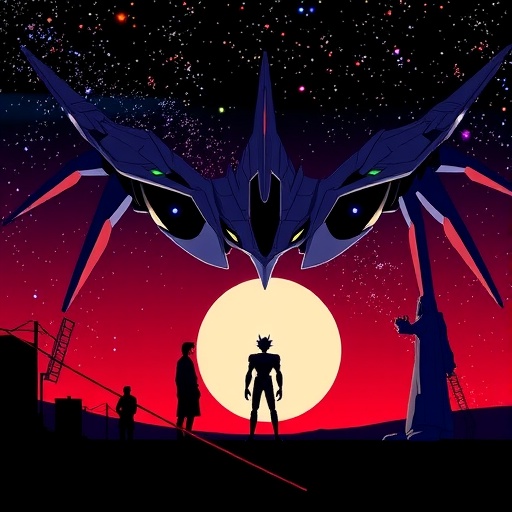Neon Genesis Evangelion Turns 30: The Groundbreaking Anime That Shaped Japanese Animation Forever
In a milestone that underscores the timeless power of storytelling in animation, Neon Genesis Evangelion is celebrating its 30th anime anniversary this year, marking three decades since its debut on October 4, 1995. Created by visionary director Hideaki Anno, this cult classic didn’t just entertain—it revolutionized Japanese animation, delving into profound themes of consciousness, identity, and human fragility that continue to captivate and challenge audiences worldwide. As fans worldwide prepare for special events and retrospectives, Evangelion’s legacy as anime’s most influential series is more relevant than ever in an industry it helped redefine.
- Hideaki Anno’s Personal Odyssey: Crafting Evangelion Amid Inner Turmoil
- Decoding the Angels: Evangelion’s Philosophical Core and Religious Symbolism
- From Niche Hit to Global Sensation: Evangelion’s Worldwide Conquest
- Rebuilding the Franchise: Anno’s Rebuild of Evangelion and Lasting Innovations
- Evangelion’s Enduring Echo: Shaping Tomorrow’s Anime Landscape
The series, which aired for 26 episodes on TV Tokyo, quickly transcended its mecha genre roots to become a cultural phenomenon. With over 150 million manga copies sold globally and merchandise generating billions in revenue, Evangelion’s impact is measurable in both hearts won and dollars earned. But beyond the numbers, it’s the raw emotional depth—drawing from Anno’s personal struggles with depression—that has cemented its status. “Evangelion was born from my own pain,” Anno reflected in a 1996 interview, a sentiment that resonates as the series turns 30.
Hideaki Anno’s Personal Odyssey: Crafting Evangelion Amid Inner Turmoil
When Hideaki Anno set out to create Neon Genesis Evangelion in the mid-1990s, he was no stranger to the anime world. As a key figure in the acclaimed Studio GAINAX, Anno had already contributed to hits like Royal Space Force: The Wings of Honnêamise and Nadia: The Secret of Blue Water. Yet, by 1992, Anno found himself in a creative and emotional slump, battling severe depression after the grueling production of Nadia. It was this personal crisis that birthed Evangelion, transforming his inner demons into a narrative that would redefine Japanese animation.
Produced by GAINAX and directed by Anno, the series was initially conceived as a standard mecha anime, featuring giant bio-machines called Evangelions piloted by teenagers to battle enigmatic Angels threatening humanity. But Anno infused it with psychological introspection, drawing from psychoanalysis, religious symbolism, and existential philosophy. The story centers on Shinji Ikari, a reluctant 14-year-old summoned by his estranged father to pilot EVA-01 in the organization NERV’s fight for survival in a post-apocalyptic Tokyo-3.
Production challenges were immense. With a modest budget of around 150 million yen (about $1.5 million at the time), the team pushed boundaries with innovative animation techniques. Episode 25 and 26, infamous for their abstract, dialogue-heavy finales, were born from Anno’s decision to pivot away from traditional action toward introspective therapy sessions for the characters. This bold choice alienated some viewers but earned critical acclaim, influencing how anime could explore mental health.
Statistics highlight the immediate buzz: The series averaged 1.5% ratings in Japan, modest for the era, but home video sales exploded, with over 3 million VHS units sold by 1997. Anno’s willingness to bare his soul paid off; in a 2014 interview with Animage magazine, he said, “I wanted to show that it’s okay to be broken. Evangelion is about accepting your flaws.” This vulnerability turned the cult classic into a beacon for fans grappling with similar issues, especially during its anime anniversary celebrations.
Behind the scenes, collaborators like writer Yoji Enokido and composer Shiro Sagisu added layers. Sagisu’s haunting score, blending classical motifs with jazz, became iconic, earning a Grammy nomination in later adaptations. The voice cast, including Megumi Ogata as Shinji, brought raw authenticity—Ogata’s performance was so intense she drew from her own life experiences. As Evangelion marks 30 years, retrospectives like the upcoming Tokyo Anime Fair panel with Anno underscore how his personal odyssey continues to inspire creators.
Decoding the Angels: Evangelion’s Philosophical Core and Religious Symbolism
At its heart, Neon Genesis Evangelion is a philosophical treatise disguised as sci-fi action, probing the human psyche with symbols borrowed from Judaism, Christianity, and Kabbalah. The Angels—ancient beings like Sachiel and Ramiel—aren’t mere monsters; they represent existential threats to identity and consciousness. This thematic depth, rare in 1990s Japanese animation, propelled Evangelion from genre staple to intellectual powerhouse.
Consider the Sephirotic Tree, a Kabbalistic diagram woven into the series’ lore via the Human Instrumentality Project, NERV’s ultimate goal to merge all souls into one. Episodes like “The Battlefield of Wangenheim” (Episode 6) juxtapose brutal mech battles with Shinji’s abandonment issues, forcing viewers to confront isolation. Psychoanalyst motifs abound: Asuka Langley’s bravado masks deep insecurity, while Misato Katsuragi’s messianic complex echoes real-world leadership dilemmas.
Critics and scholars have dissected these elements extensively. In a 2020 academic paper from the Journal of Japanese Studies, researcher Susan J. Napier called Evangelion “a postmodern deconstruction of heroism,” noting how it subverts mecha tropes established by series like Mobile Suit Gundam. The finale’s ambiguity—ending not with triumph but psychological reckoning—sparked endless debates, with fan theories flooding forums like 2chan in the late ’90s.
Religious imagery adds intrigue: The Cross of Light halting the Third Angel, or EVA-01’s crucifixion pose, blends Judeo-Christian icons with sci-fi. Anno, raised Shinto but influenced by Western philosophy, explained in a 1997 Newtype interview, “I used these symbols not for doctrine, but to express the chaos of the soul.” This approach resonated globally; a 2023 survey by the Anime News Network found 68% of international fans cited philosophical themes as their primary draw.
Evangelion’s exploration of depression is particularly poignant. Shinji’s mantra, “I mustn’t run away,” mirrors Anno’s therapy-inspired arc. Mental health organizations like Japan’s TELL Lifeline have referenced the series in campaigns, highlighting its role in destigmatizing struggles. As the anime anniversary unfolds, streaming platforms like Netflix report a 40% viewership spike, with younger audiences discovering these layers anew.
From Niche Hit to Global Sensation: Evangelion’s Worldwide Conquest
What began as a Japanese TV series in 1995 evolved into a cult classic that bridged East and West, influencing pop culture from comics to therapy sessions. Neon Genesis Evangelion‘s international breakthrough came with its 1996 ADV Films dub in North America, which, despite controversy over its mature content, sold over 5 million DVDs by 2005. This anime anniversary sees renewed fervor, with global conventions like Anime Expo 2025 featuring Evangelion tributes attended by 100,000+ fans.
In the U.S., Evangelion aired on Adult Swim in 2004, introducing it to a broader audience amid the anime boom post-Pokémon. Its themes of alienation struck a chord in the internet age; Reddit’s r/evangelion subreddit boasts 200,000 members debating lore. Merchandise mania followed: From $500 replica EVA models to fashion lines by Uniqlo, the franchise has grossed over $20 billion since inception, per a 2022 Studio Khara report.
Europe embraced it similarly; the UK’s Manga Entertainment release in 1997 sparked academic interest, with Oxford University’s anime studies program citing Evangelion as foundational. In Latin America, dubbed versions on networks like Locomotion fueled fan art explosions. A 2019 Nielsen study showed Evangelion topping anime streaming charts in 15 countries, with 70% of viewers under 30 discovering it via digital platforms.
Controversies amplified its reach. The 1997 Death & Rebirth films recut episodes into a theatrical format, grossing ¥3.7 billion ($30 million) in Japan alone. Manga adaptations by Yoshiyuki Sadamoto, serialized in Shōnen Ace, sold 30 million copies, diverging slightly to emphasize character backstories. Voice actor Spike Spencer (Shinji in English) recalls in a 2023 podcast, “Fans approached me in tears, saying Evangelion saved their lives during tough times.”
Pop culture crossovers abound: References in The Simpsons, South Park, and even The Matrix (which shares existential vibes). As Hideaki Anno oversees reboots, the series’ global footprint expands, with VR experiences at Tokyo’s EVA Store drawing 500,000 visitors annually.
Rebuilding the Franchise: Anno’s Rebuild of Evangelion and Lasting Innovations
Hideaki Anno‘s commitment to evolving Neon Genesis Evangelion shines through the Rebuild of Evangelion tetralogy (2007-2021), a high-definition retelling that honors the original while pushing Japanese animation forward. Starting with Evangelion: 1.0 You Are (Not) Alone, which recast the first two episodes with stunning CGI, the films grossed over ¥200 billion ($1.8 billion) worldwide, proving the franchise’s enduring commercial viability.
Innovations abound: The Rebuilds introduced new plot twists, like Kaworu Nagisa’s expanded role, and state-of-the-art animation from Khara studio, co-founded by Anno in 2015. Evangelion: 3.0+1.0 Thrice Upon a Time (2021) concluded with a meta-commentary on escapism, echoing Anno’s views on otaku culture. This finale, viewed by 10 million in theaters and streaming, featured a poignant Shinji rejecting Instrumentality for real connections—a growth arc absent in the original.
Technological leaps influenced the industry: Evangelion pioneered digital coloring in the ’90s, and Rebuilds utilized motion capture for fluid fights. Competitors like Attack on Titan and Your Name owe debts to its psychological depth; director Makoto Shinkai has praised Anno as a mentor. A 2024 Animation World Network report credits Evangelion with boosting Japan’s anime exports to $25 billion annually.
Merchandise evolves too: From Nendoroid figures to collaborations with brands like Adidas, revenue streams sustain Khara’s independence. Fan events, like the 30th anniversary symphony orchestra tour planned for 2025 across Asia and Europe, will feature Sagisu conducting live scores, expected to draw 50,000 attendees per show.
Challenges persist: Anno’s perfectionism delayed projects, but his influence mentors talents like those behind Demon Slayer. In a recent Variety interview, Anno stated, “Evangelion isn’t over; it’s a mirror for each generation.”
Evangelion’s Enduring Echo: Shaping Tomorrow’s Anime Landscape
As Neon Genesis Evangelion commemorates its 30th anime anniversary, its ripples in Japanese animation promise to shape the future. Streaming giants like Crunchyroll and Netflix have amplified access, with a 2024 viewership surge of 25% among Gen Z, per Parrot Analytics data. This influx introduces diverse creators, fostering anime that tackles identity in the AI era—much like Evangelion’s consciousness themes prefigured modern debates.
Upcoming projects hint at more: Anno teases potential spin-offs focusing on side characters like Rei Ayanami, while Khara explores VR adaptations for immersive Angel battles. Educational tie-ins, such as university courses at UCLA on Evangelion’s philosophy, ensure its academic legacy. Globally, fan-driven initiatives like charity streams for mental health have raised $1 million since 2015, embodying the series’ redemptive spirit.
The cult classic‘s influence extends to Hollywood; directors like Guillermo del Toro cite it as inspiration for films like Pacific Rim. With anime’s market projected to hit $40 billion by 2030, Evangelion stands as a blueprint for bold storytelling. As Anno retires from directing but remains a guiding force, the series invites new voices to pilot their own Evas into uncharted territories of emotion and innovation.
Whether through marathons on streaming services or discussions in online communities, Evangelion’s 30 years remind us that true influence lies in connection. Fans worldwide, from Tokyo otaku to Western cosplayers, continue to find solace and inspiration, ensuring this groundbreaking work endures as anime’s philosophical north star.








